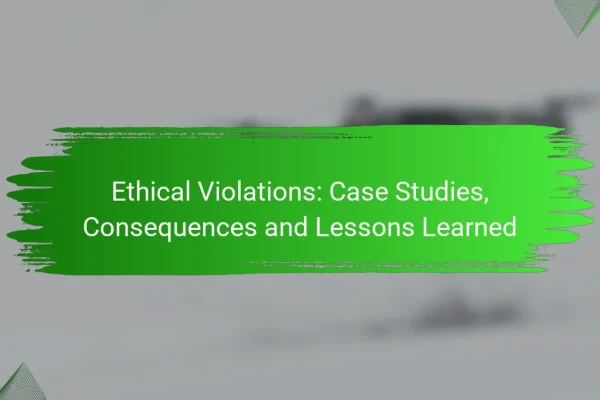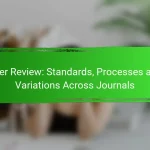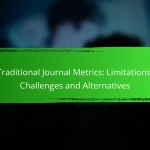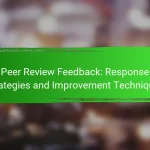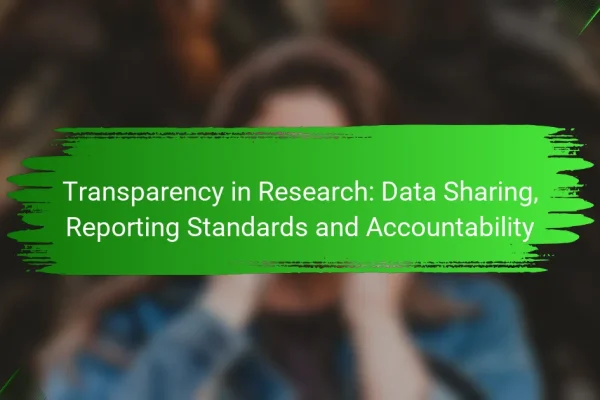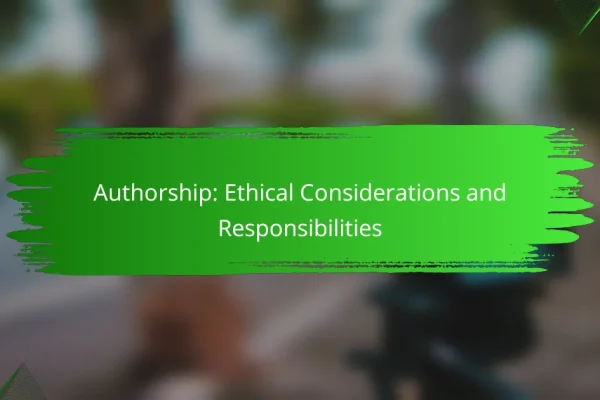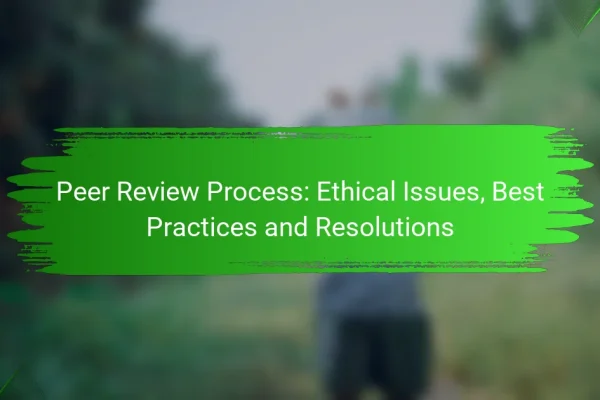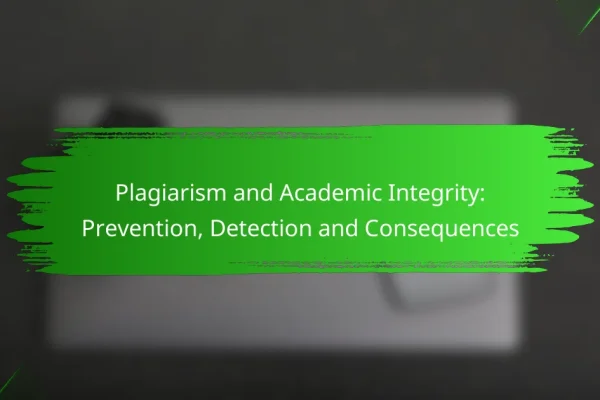What are the ethical challenges in academic publishing?
Ethical challenges in academic publishing include issues such as plagiarism, data manipulation, and biases in peer review. These challenges can undermine the integrity of research and affect the credibility of academic institutions.
Plagiarism and copyright violations
Plagiarism involves using someone else’s work or ideas without proper attribution, while copyright violations occur when published material is reproduced without permission. Both practices can lead to severe consequences, including retraction of published work and damage to an author’s reputation.
To avoid plagiarism, researchers should always cite sources accurately and use quotation marks for direct quotes. Familiarity with copyright laws and fair use guidelines is essential for ensuring compliance when using existing works.
Data fabrication and falsification
Data fabrication refers to the creation of false data, while data falsification involves manipulating research data to produce misleading results. Both practices compromise the validity of research findings and can lead to significant ethical breaches.
Researchers should maintain transparency in their data collection and analysis processes. Regular audits and adherence to ethical guidelines can help prevent these issues and ensure the integrity of research outcomes.
Peer review bias
Peer review bias occurs when reviewers allow personal opinions or conflicts of interest to influence their evaluation of a manuscript. This can lead to unfair rejections or approvals, skewing the publication process.
To mitigate bias, journals often implement double-blind review processes, where both authors and reviewers remain anonymous. Authors should also disclose any potential conflicts of interest to promote transparency.
Publication pressure and academic misconduct
Publication pressure refers to the intense demand for researchers to publish frequently, which can lead to unethical practices such as self-plagiarism or manipulating results to achieve publication. This pressure can create a toxic environment that prioritizes quantity over quality.
To combat this, institutions should promote a culture that values quality research and ethical practices. Researchers should focus on producing meaningful contributions rather than succumbing to the pressure of publishing for the sake of metrics.
How can researchers ensure ethical publishing practices?
Researchers can ensure ethical publishing practices by following established guidelines, maintaining transparency in their research, and utilizing tools to detect plagiarism. These steps help uphold the integrity of academic work and foster trust in the research community.
Adhering to journal guidelines
Each academic journal has specific guidelines that authors must follow when submitting their work. These guidelines typically cover formatting, citation styles, and ethical considerations such as conflicts of interest and authorship criteria. Familiarizing oneself with these requirements can prevent delays in the review process and increase the chances of acceptance.
Researchers should carefully read the submission guidelines and ensure their manuscript aligns with the journal’s expectations. This includes adhering to word limits, referencing styles, and ethical standards related to human or animal research.
Engaging in transparent research practices
Transparency in research practices involves openly sharing methodologies, data, and findings to allow for reproducibility and verification. Researchers should consider pre-registering their studies, sharing raw data, and providing detailed descriptions of their methods. This openness not only enhances credibility but also contributes to the collective knowledge of the field.
Maintaining a clear record of all research processes, including any changes made during the study, is crucial. This documentation can help clarify the research trajectory and support the validity of the results presented.
Utilizing plagiarism detection tools
Plagiarism detection tools are essential for ensuring the originality of research work. These tools can identify unintentional similarities with existing literature, helping authors correct potential issues before submission. Popular services include Turnitin and Grammarly, which provide detailed reports on text similarity.
Researchers should run their manuscripts through these tools prior to submission. This proactive step can help avoid ethical breaches and the potential consequences of plagiarism, which can include retraction of published articles and damage to professional reputation.
What are the consequences of unethical behavior in publishing?
Unethical behavior in academic publishing can lead to severe consequences, including damage to professional reputations, retraction of published works, and potential legal issues. These repercussions can affect not only the authors involved but also the integrity of the academic community as a whole.
Reputation damage for authors
Authors who engage in unethical practices risk significant harm to their professional reputation. This can result in loss of credibility among peers, reduced opportunities for collaboration, and diminished chances of securing funding or positions in reputable institutions.
For instance, if an author is found guilty of plagiarism, it can lead to a permanent stain on their academic record, making it difficult to publish future work or be taken seriously in their field.
Retraction of published papers
Unethical behavior often leads to the retraction of published papers, which can disrupt the academic discourse. Retractions are typically initiated when misconduct, such as data fabrication or plagiarism, is discovered.
A retracted paper not only affects the author but also impacts other researchers who may have cited the work, leading to confusion and a potential loss of trust in the research process.
Legal repercussions
Engaging in unethical publishing practices can also result in legal consequences. This includes potential lawsuits for copyright infringement or breach of contract, which can be costly and time-consuming.
In some cases, institutions may impose disciplinary actions against authors, including termination or suspension, further complicating their professional lives. It is essential for authors to adhere to ethical standards to avoid these pitfalls.
How do institutions promote ethical standards in publishing?
Institutions promote ethical standards in publishing through comprehensive training and the establishment of clear policies. These practices help ensure that researchers and authors understand the importance of integrity and accountability in their work.
Implementing training programs
Training programs are essential for educating faculty and students about ethical publishing practices. These programs often cover topics such as plagiarism, authorship criteria, and the peer review process.
Institutions may offer workshops, online courses, or seminars to facilitate this training. Regularly scheduled sessions can help reinforce these principles and keep the community informed about evolving standards.
Establishing clear policies
Clear policies regarding ethical publishing are crucial for guiding researchers in their work. Institutions should develop and disseminate guidelines that outline acceptable practices and the consequences of unethical behavior.
These policies can include procedures for reporting misconduct, definitions of authorship, and expectations for transparency in research funding. Regular reviews and updates to these policies ensure they remain relevant and effective in promoting integrity.
What role do publishers play in maintaining ethics?
Publishers play a crucial role in upholding ethics in academic publishing by establishing and enforcing standards that ensure integrity and transparency. They are responsible for creating guidelines that authors must follow, as well as monitoring compliance to maintain the credibility of published research.
Enforcing ethical guidelines
Publishers enforce ethical guidelines by implementing policies that address issues such as plagiarism, authorship disputes, and data fabrication. These guidelines are often based on widely accepted standards from organizations like the Committee on Publication Ethics (COPE).
To ensure compliance, publishers may conduct regular audits of submitted manuscripts and published articles. They also provide mechanisms for reporting unethical behavior, which can include retractions or corrections when necessary.
Providing resources for authors
Publishers provide various resources to assist authors in understanding and adhering to ethical standards. This may include detailed author guidelines, workshops, and online tutorials that cover topics such as proper citation practices and conflict of interest disclosures.
Additionally, many publishers offer support through editorial offices that can answer questions about ethical concerns. Authors are encouraged to utilize these resources to avoid common pitfalls and ensure their work meets ethical expectations.
What are the emerging trends in ethical academic publishing?
Emerging trends in ethical academic publishing focus on transparency, integrity, and accountability. These trends aim to enhance the credibility of research and ensure that published work adheres to high ethical standards.
Increased Transparency in Peer Review
Many journals are adopting open peer review processes, where reviewer comments and author responses are made publicly available. This shift promotes accountability and allows readers to assess the quality of the review process.
Additionally, some publishers are implementing transparent reporting practices, such as disclosing conflicts of interest and funding sources. This helps readers understand potential biases in the research presented.
Data Sharing and Reproducibility
There is a growing emphasis on data sharing to enhance reproducibility in research. Many funding agencies and journals now require authors to make their datasets publicly accessible, allowing other researchers to verify findings.
Reproducibility initiatives encourage researchers to publish their methodologies alongside results, fostering a culture of openness. This practice can help mitigate issues related to research misconduct and improve trust in scientific findings.
Addressing Publication Ethics and Misconduct
As the landscape of academic publishing evolves, addressing publication ethics is becoming increasingly critical. Issues such as plagiarism, duplicate publication, and authorship disputes are under scrutiny.
Many institutions and publishers are developing clear guidelines and training programs to educate researchers about ethical publishing practices. This proactive approach aims to reduce instances of misconduct and promote responsible research behavior.
